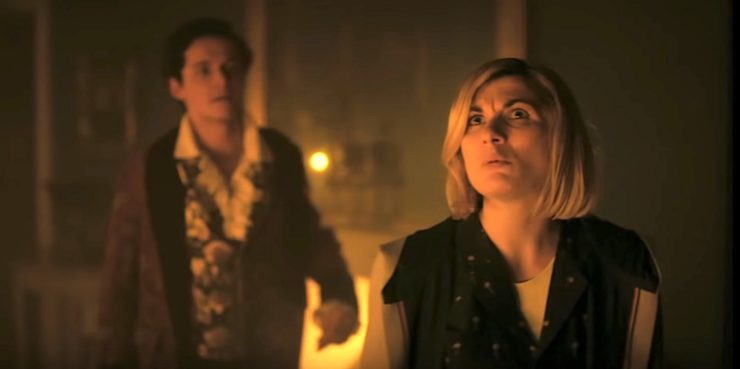The Doctor and friends show up to a haunted house full of writers and end up meeting an old enemy instead. Does this episode inspire, or all flat? Let’s talk it out.
Time to dig into “The Haunting of Villa Diodati”.
Sylas: So… I didn’t like this episode. I was really invested in the moving haunted house aspect, but I feel like it should have been two or three episodes based on the themes they have to tackle, and I hate that it’s Byron and Percy and Mary Shelley. I’m not sure what the point was, other than to draw a parallel between Cybermen and Frankenstein’s Monster.
Emmet: Yep. My biggest problem is that this despite being clear on Byron being an ass, and putting in all these little details to make the events line up with what we know of history on that night, this story gives the greatest insult possible: It suggests that Mary Shelley didn’t come up with the idea of Frankenstein on her own, that the story came from this moment where she met a Cyberman. And despite the cleverness of that idea, it completely undercuts her creativity and ownership of Frankenstein. Given Mary Shelley’s importance as one of the earliest creators of SFF and genre fiction as we know it today, I can’t believe Doctor Who did such a disservice to her.
Sylas: Yeah, you’ve talked to me about that trope before, because it crops up in media every so often. I think people like the idea because it makes them feel special. It’s like the writer of the episode, and by extension the viewer, kind of gets to have a little piece of the credit for Frankenstein. But it’s so frustrating, not only because it robs Mary Shelley, but because it suggests that this is how creativity works. It’s just a slightly different version of the trope where inspiration just strikes and great writings and art come out fully fledged like some kind of supernatural bolt of genius.
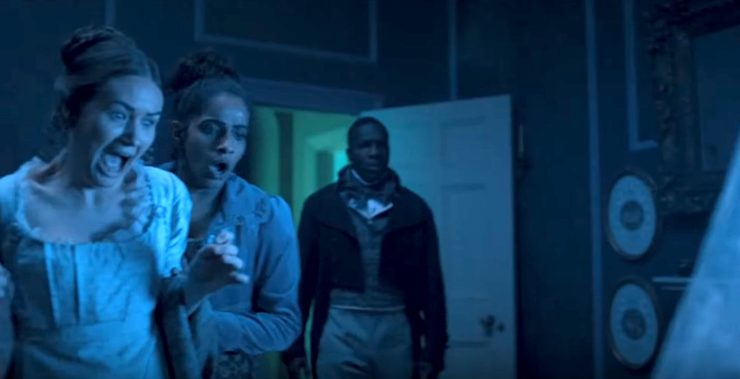
Emmet: They didn’t even make Mary Shelley the center of the episode. Percy Shelley is the important one, he’s the one with the Cyberium in him, he’s the guardian. Her main focus is to be in love with him and to be a mom. Even what she talks to the lone cyberman about is parent stuff.
Sylas: That was so weird. It’s a great sentiment, and it’s a very Doctor Who-ish speech. The fact that it doesn’t work on the lone cyberman is a really powerful gut punch that really reinforces his character and lets us know how dangerous he is.
Buy the Book
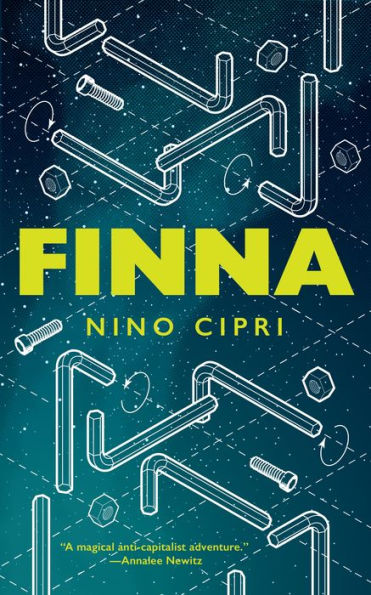

Finna
Emmet: It almost feels like the writer of the episode, found that it was a lot more fun writing Lord Byron—which is totally understandable because he’s hilarious as a person and it’s really enjoyable to poke fun at him the whole time—and is also maybe personally a bigger fan of Percy Shelley, which is why they both get more of the focus.
Sylas: Mary’s not even centered in the narrative. It’s really weird that team TARDIS shows up specifically because this is the night Mary Shelley conceives the idea for Frankenstein, but then the entire narrative is about something different. I kept thinking of “The Unicorn and the Wasp” and how that episode is so good at weaving in Agatha Christie’s importance as a writer into the unfolding of the plot, but rather than the alien influencing her, she’s the one accidentally influencing the alien. The episode actually becomes about her power, rather than the other way around.
Emmet: How much more amazing would this episode have been if it had taken place after Frankenstein came out, and it was just some woman who was obsessed with the book and then the cyberman showed up and she was like oh no it’s real.
Sylas: This episode would have been much, much better if the Doctor and co had just ended up in a random home in the late 18th century and then had a locked-room style adventure. Honestly, I didn’t like how everything ended up being about the Cyberium, and I really would have liked a haunted house episode where the problems just turned out to be some random, normally not dangerous alien technology that got sucked into some human by mistake. Because that part, with Percy Shelley not really able to control the perception filter, was really interesting, and I personally love Doctor Who episodes where the aliens or technology aren’t actually bad.
Emmet: That reminds me, why did the Doctor say the house felt evil? If it was Percy controlling it, it shouldn’t feel evil.
Sylas: Yeah, I guess because the power itself was the Cyberium? I still can’t figure out why the Cyberium didn’t want to go to the lone cyberman in the first place. Like I get that some enemy of the Cybermen sent it back in time to stop them, but shouldn’t it want to get back to the Cybermen?
Emmet: I think so. It definitely wants to stay in its host, and might even compel the host to protect it in some way.
Sylas: And then the Doctor said it wanted to be in her, not the cyberman, which was weird. Maybe it’s like the One Ring and it just wants to be in the most powerful person in the room.
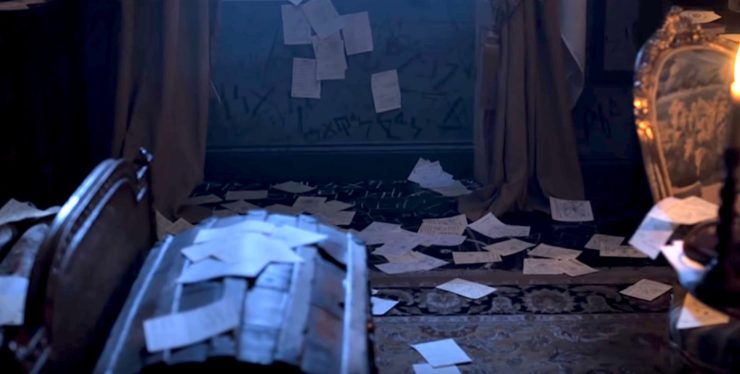
Emmet: That’s what it seemed like. It wasn’t very clear.
Sylas: A lot of it wasn’t very clear. And I felt like they had such big powerful themes that they quashed into one short episode. There’s the theme that the Doctor is always forced to make the big decisions about who can be saved and who can’t, and protecting the timeline, and choosing between a few people dying or many. And then there’s the theme of the importance of words. And then there’s the theme of the Doctor usually always being able to pull off a last-minute save of a situation to stop the bad guys, and this time not being able to do that.
Emmet: Yeah. I loved her speech about how words are important. I wish she had been saying it about someone else, though. It’s such an momentous thing to say at a point in time where we keep talking about the power of language, and it matters a lot, but it’s not just about the great titans of literature. It’s about everyone, and the moment would have been better served if she had been talking about someone we didn’t know about.
Sylas: Right, because she’s talking to Ryan about how one life is just as important as the thousands that will die by the Cybermen, and about how a single life changed will affect the future in huge ways, but because she’s talking about someone famous and specifically about how this famous person’s words carry on through time, it sounds like it’s only because of those things that his life matters. And it really brings up for me something that has been bothering me for a while, which is—why is almost every episode this season about them meet up with famous historical figures?
Emmet: And again—this time she didn’t mindwipe any of them.
Sylas: Ugh, you’re right. That’s… I mean if she had mindwiped them, that at least would have addressed some of your complaints about Mary Shelley’s inspiration for Frankenstein. I would still like it better if it wasn’t her and Byron et all, but it would at least have been a little better. I mean, it would have been better if she showed up at one of their parties after Shelley had already written Frankenstein, and then had her confront this alien from the future who is actually very much like what she had written.
Emmet: True. And then her desire to reach him compassionately, and to connect with his emotions, would have been about confronting the very themes she wrote about in the real world.
Sylas: Yeah, I agree with that. But I also agree that there was really no reason for them to be in the episode at all. Doctor Who has always been pretty sparing with having the Doctor and companions meet up with historical figures, and the ones we actually see on screen usually end up being accidents, like it was with Charles Dickens, and Agatha Christie, and Madame de Pompadour.
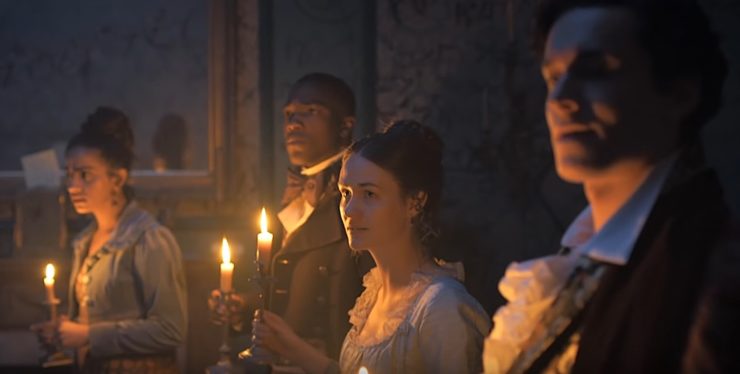
Emmet: Queen Victoria and Shakespeare, too. They do meet Van Gogh on purpose, but it’s not as common.
Sylas: Yeah, I mean, there’s a bunch, of course. I know I’m forgetting a lot of them, especially the ones from Moffat’s era. But I do like most of the “accidental meeting” episodes better. They fit into the sort of bombastic, coincidence-as-fate style of the New Who universe, like to the point where it’s a joke. Wait, we met Charles Dickens and then ghosts showed up? Agatha Christie’s here and suddenly someone gets murdered in the library with a lead pipe? Life with the Doctor isn’t just about seeing incredible things, it’s also about seeing how friggin’ weird the universe really is.
Emmet: I’m still thinking about the part where Ryan was so upset that someone was threatening to get a gun and shoot him. I’m sure that reads worse to an American audience, where the threat of gun violence is a present and terrifying issue, but yikes. Also I thought Polidori’s sleepwalking thing was a little weird.
Sylas: I liked that, actually. His character is kind of the least developed and the episode is such a mess, I think that’s why it comes off weird. But the idea of a sleepwalker being unaffected by a perception filter was really clever, I thought, and I loved that being the detail that allowed the Doctor to work it out. That’s kind of what I was driving at when i said this felt like several episodes worth of themes. You could do a whole locked room, haunted house episode that hinges just on the mystery of the perception filter. And then you could do a whole other one that was about the team trying to keep some man who is not Percy Shelley safe from the lone cyberman, only to have the doctor eventually realize that she can’t protect him and the Cyberium, and making the choice that she makes at the end of this episode.
Emmet: I loved the joke about her being from the North.
Sylas: Yes! That was such a lovely callback.
Emmet: I also thought Ryan trying to play chopsticks on the piano, and having trouble, but still trying.
Sylas: I really need to learn to be more like Ryan. His whole thing about Grace teaching him that there’s no reason not to try, and to keep at it, is something I really feel like I could stand to internalize.
Emmet: You definitely could, my love.
Sylas: Graham was also really cute in this episode. Ghosts brought him food! And the Doctor saying that she might be the Guardian was so funny.
Emmet: And Yaz is slightly gay for the Doctor, when she was talking to Miss Clairmont about enigmatic people, and if they would trade it for “reliable and dull.”
Sylas: Yeah, it reminded me of Martha a little, and how she struggled. We also got a return of the Doctor’s attitude about being the big magic decider person, with that whole “the structure of this team is a mountain, and I’m the summit making all the hard decisions alone” thing. I think this is the first time we’ve really seen her put her foot down so strongly.
Emmet: I wish they had leaned on that a little harder, at least in explaining why she feels that way. Because it’s about her having the broader perspective and the experience to weigh things, but that’s never mentioned in context. But the best return of all?
Sylas: Yes?
Emmet: The Doctor in that awesome waterloo helmet.
Sylas: I love a good plume!
Emmet: It’s cutest when she does it.
Sylas: You are not wrong.
Sylas K Barrett approves of Graham and his need for snacks.
Emmet Asher-Perrin did like the creepy maybe-ghosts, though.










